Chilean Liberals' Police State
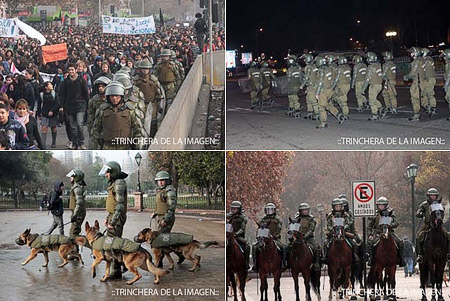

The Chilean president ordered a 20% increase in size – by a total of 10,000 servicemen – of the Carabineros corps under the pretext of fighting crime and backed a campaign meant to improve the image of the paramilitary formation which, along with the DINA secret police, ruined its reputation by cruelly suppressing dissent under Augusto Pinochet. At the moment Piñera is in the process of implementing a deep reform of the Chilean agencies responsible for national security and the struggle against organized crime, arms-dealing, drug-trafficking, etc. The steps could be seen as completely rational were it not for the Chilean liberal regime's repressive political agenda that increasingly looms behind them.
Last February Piñera introduced new regulations for the police and public security ministry, the key novelty being the establishment of Division de Estudio - a research division charged, among other tasks, with fighting against threats to public order. The division's mission additionally includes the development of new approaches to identifying and neutralizing sources of social and political conflicts. The outline of the threats as released by the police ministry appeared suspiciously short and vaguely worded, but the statements made by individual police and security service top officers left an impression that the division would focus on preventing “extremist” outbreaks on symbolic dates like May 1 (the Labor Day), September 11 (the day Allende's government was toppled), and March 29 (the Young Fighter day).
Division de Estudio, in cooperation with the public order department, will maintain a record of strikes and various social, ecological or employment-related conflicts in Chile based on the information supplied by local administrations. The division must suppress violations of public order by “radicals”, preferably with the help of preemptive measures. Special attention is going to be given to Chile's regions with a legacy of socioeconomic problems – those inhabited by the so-called “socially unadapted” and “conflict-oriented” Chileans. The number of people fitting into the category tends to grow steadily as Chile's neo-liberal economy keeps shutting masses of the “unadapted” out of the sphere of social progress.
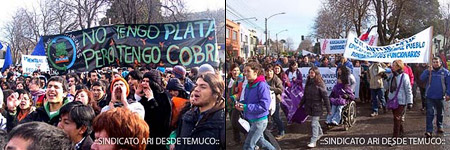
An arsenal of advanced means of surveillance and a pervasive network of agents will be used to tighten control over student and youth unions in Chile. Young candidates for security service employment will continue to be recruited as informers who typically work as apartment block attendants watching over suspect tenants, infiltrate the inner circles of persons of interest to security agencies, or join rallies to spy on protesters. Time-tested agents are occasionally sent to provoke violent outbreaks: broken store windows, crippled advertising posters, and Molotov cocktails hurled at police vehicles are then cited to justify police crackdowns with clubs, tear gas, and water cannons. Occasionally, protesters do identify provocateurs, and the police pledges investigations but always helps the agents stay out of trouble.

In several incidents that drew massive coverage, “unknown masked protesters” burned down Chilean flags, the media comments being built around claims that those who are pushing for free education are unpatriotic and therefore deserve no social benefits. Pretending to be unaware of regular massive and completely peaceful student rallies in Chile, the country's secretary of education Joaquín Lavín readily described what was shown on TV in the aforementioned cases as events staged by small, ideologically-biased, and violence-prone groups.
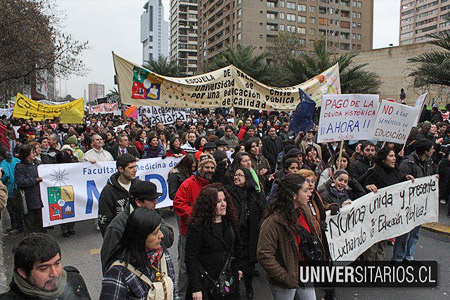
No doubt, extremist groups also exist in Chile. Public concern across the country was caused by a series of bombings which, as the investigation stated, were carried out by a group of 25 people from various social backgrounds. The attacks continued for several years, targeted banks, trade centers, and police departments, and were of a clearly anti-systemic, anti-capitalist character.
Though the perpetrators were never caught red-handed, arrests of a number of suspects did follow. Some of those held had to be released shortly due to lack of implicating evidence, while those who remain in custody are denying all charges. One of them, Omar Hermosilla Marín, asserts that police simply needed to report some kind of success in cracking the case and scapegoated members of Mapu Lautaro, a group known to have been taking part in armed struggle against Pinochet's regime. Marín refers to his colleagues and himself as political prisoners, saying: “There is no evidence whatsoever. The cases are crumbling and none of them actually made it to court, but a media campaign unleashed by outlets formerly engaged with Pinochet's regime makes it possible to keep people behind bars”. In Marín's view, the blasts are attributable to anarchist groups. “For us, such methods are a matter of a distant past, our cause being the political struggle these days”, says Marín.
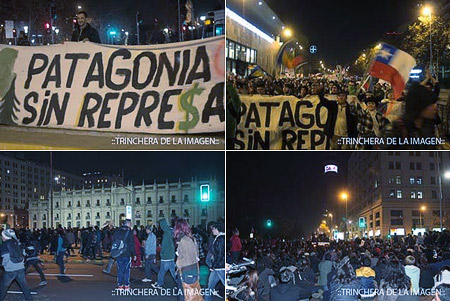
Indian groups are known to come under mounting political pressure in Chile. For decades, the world has been witnessing the struggle Mapuches, a group of indigenous inhabitants of south-central Chile, have to wage for the right to live on their original territories and to safeguard their Araucania region against the neo-liberal economy's appetites for the natural resources of the terrain. The conflict between the Indian communities and aggressive investors recurred under Eduardo Frei and Michelle Bachelet, both from the left-centrist Unidad Popular coalition, as well as under incumbent president Piñera. As a rule, Mapuche protests are led by young people who as a result face the liberal administration's ire. Many of the young Mapuche leaders are educated individuals, hold degrees from West European and Canadian universities and realize with utmost clarity what miserable future awaits their people if their lands fall victim to the predatory neo-liberal privatization. This explains the intensity of the resistance put up by Mapuches who oftentimes refuse to talk to local and central administrations, block expressways, or even torch timber factories incidentally owned by retired Pinochet's colonels and generals. Sometimes the conflicts escalate into mountain firefights in the wake of which the police and Carabineros launch sweeping raids against the Mapuche.
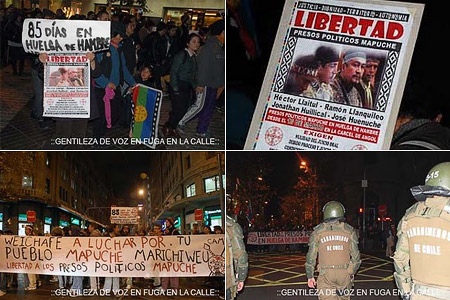
Jail terms ranging from 5 to 25 years were handed out to young Mapuche leaders Hector Llaitul, Ramon Llanquileo, Jose Huenuche and Jonathan Huillical for alleged murder attempts and armed robberies. In the cases, evidence was brazenly forged and testimony was contributed by unanimous masked witnesses. The indigenous leaders responded to the situation with a hunger strike which lasted for 80 days and – due to the imminent lethal risks – prompted their defenders to seek assistance from the Inter-American Commission on Human Rights. A tide of protests in Argentine, Mexico, Canada, Spain, France, Germany, and other countries eventually forced Chile's supreme court to slash the Indian leaders' jail terms.
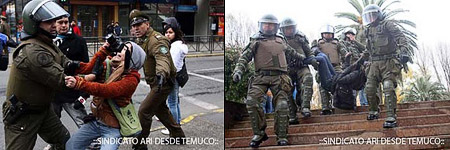
Amnesty International is calling the Chilean administration to tone down the suppression of social protests, warning that the current practice puts the future of democracy in Chile in jeopardy. The watchdog's executive director for Chile Ana Piquer directed biting criticism at the application of the anti-terrorist code to the non-violent protests multiplying throughout the country… The Chilean administration's growing fear of losing the grip on the society is an open secret, the dilemma being to crush public discontent with an even harder hand or, perhaps, to start exercising a measure of restraint.
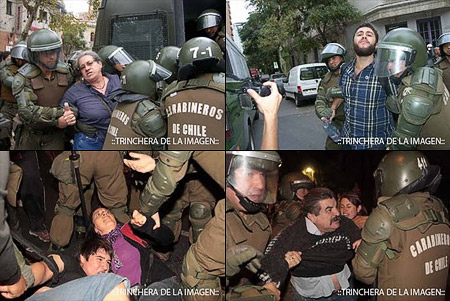
Commentators are churning out alarming forecasts, and last May, 60% of Chileans gave poor grades to Piñera's rule in public opinion polls. The oppositional and ostensibly left-centrist Unidad Popular coalition scored even worse with an 80% disapproval rating. Around 60% of Chileans similarly expressed displeasure with the country's parliament and senate, which came as the legislatures' worst performance on record.
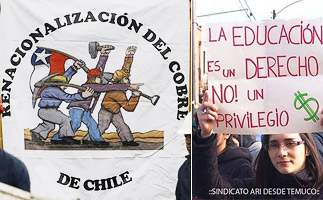
What above all scares the Chilean elite is that outraged young people uphold slogans obviously borrowed from the epoch of Salvador Allende… Contrary to the liberal propaganda's endeavors to cast a shadow over Chile's not-so-distant past, this very past seems to hold a constant attraction among the younger generation. Generally, neo-liberals across the world never felt they could trust the nations in the countries they were handling, and Chile, the showcase of liberalism, vividly exemplifies the trend. The security agencies in the country are worming into every part of the society, supervising Internet transactions, and eavesdropping into some 1,500 phone conversations daily. The bulk of acquired information must be impossible to digest, so that the administration set up a tender to develop software to automatically skim through the Internet and to probe into exchanges in social media concerning the activities of Chile's state machine. The software is required to pick and sort content depending on the political themes which are being touched upon, and, by the terms of the tender, must become exclusive state property upon the completion of the development phase of the project.

As a final remark, I must say that the above represents a minor fraction of the total amount of information currently at my disposal about the “police renaissance” in Chile.